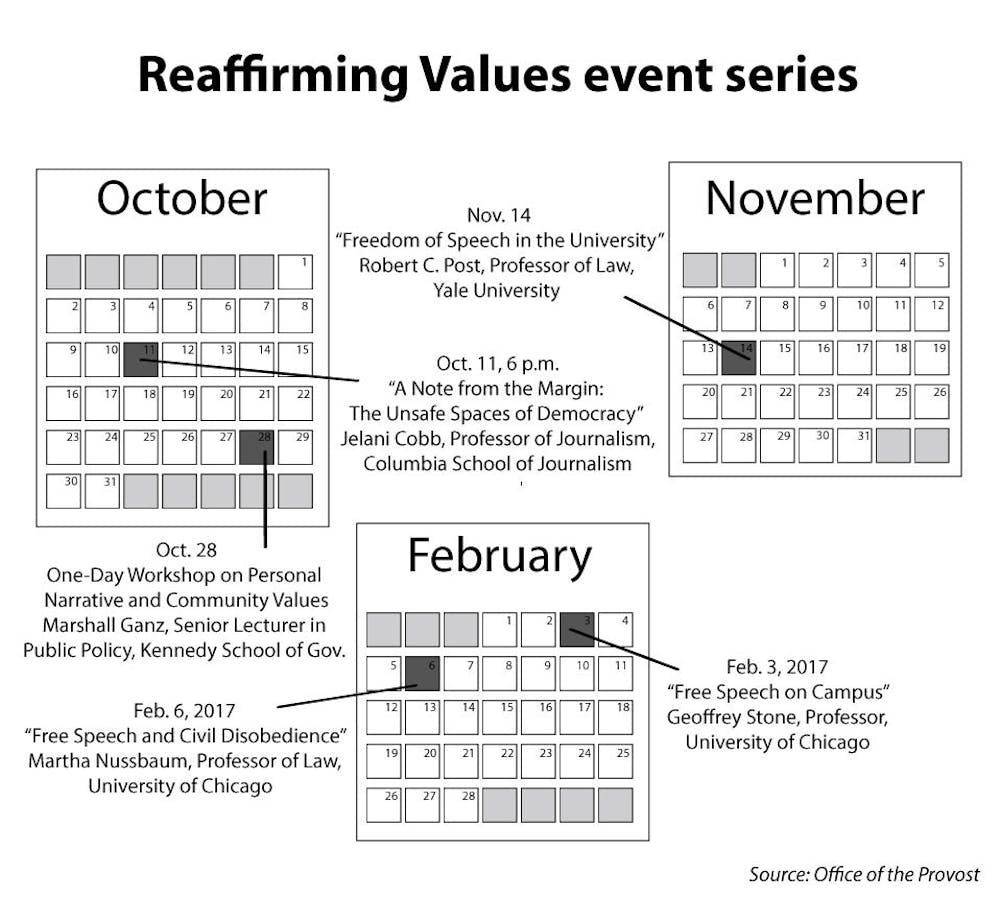Provost Richard Locke P’17 announced the new “Reaffirming University Values: Campus Dialogue and Discourse” event series coming to campus this year in a community-wide email Sept. 2, adding to the ongoing national conversation regarding open discourse on college campuses.
Locke began planning the series last winter and developed it with the help of Associate Professor of Religious Studies Nancy Khalek among many other professors with whom he had formal and informal conversations about potential speakers and the purpose of the series, he said.
The planning process was deliberate and lengthy, Locke said, because “I wanted (the series) to be about speaking across differences.”
National discussion about free speech on college campuses has increased drastically over the last few months, but Brown has dealt directly with multiple incidents regarding free speech over the last few years — including the Ray Kelly forum in 2013, the Wendy McElroy debate in 2014 and the Janet Mock talk this past spring.
But Locke disagrees with the way the press has portrayed the issues, noting that “the framing of these issues tends to be free speech versus diversity — I think that’s the wrong framing.”
In this ongoing discourse, Locke said he has found that “on campus and in public life, we’re not really speaking to each other anymore. We’re speaking past each other, and the conversations are becoming shrill.”
Khalek agreed, saying “We thought it might be more energizing and more constructive to move past arguing and (toward) listening,” she said.
Locke and Khalek both noted that the series can help move the campus away from that false dichotomy. Such conversations will aim to “get us past oversimplification even if that leads us towards complication,” Khalek said.
In working with Locke, Khalek drew upon her experiences in the classroom — where she discusses issues of race, religion, sexuality and identity in an atmosphere in which she and her students can verbally acknowledge the difficulty of having these conversations.
“The classroom had to be set up to be a place where we could stumble with confidence,” Khalek said. “In the middle of these tense and difficult conversations, we’d say ‘this is tense and hard talk about.’”
Khalek said she hoped to help “transfer that model to conversations on campus” in thinking about how to plan the series. She hopes the result helps create an ethos where people can disagree without feeling hurt or insulted and without fear, she added.
“There’s really nothing we can’t talk about, but we should be aware of how we talk about it,” Khalek said. Lectures, workshops and roundtable discussions offer opportunities to learn how to discuss difficult issues in different ways, she said, adding that it requires buy-in from people on multiple levels.
Ken Miller ’70 P’02, professor of biology, said he hopes the series will “reaffirm the right to hear” people from a diverse range of perspectives speak. Miller noted that “the issue of free expression has been contentious at Brown for quite a while,” and that he was pleased the administration has moved to address it.
But the announcement of the series was not without criticism. Mark Patinkin of the Providence Journal wrote a “translated” version of Locke’s campus letter in an op-ed; he wrote that Brown was “mealy-mouthed” and minced words where the University of Chicago and Claremont McKenna College were clear in telling students that they will have to confront open dialogue.
Unlike other universities that have simply released a statement on their positions on free speech and campus dialogue, like UChicago, Locke said he wanted to “model that behavior” of conscious conversation and engaged listening with a series of activities.
“I don’t feel the need to make a public statement” on the University’s values, especially since the conversation is occurring internally, Locke said.
Though he intends to add more events to the series, Locke included the initial list of featured speakers and workshop leaders in his email. At the moment, that list includes faculty members from Columbia’s School of Journalism, Yale, Harvard’s Kennedy School of Government and UChicago, as well as a dinner series run by Andre Willis, professor of history and religion. Locke is also working with centers on campus to offer more events relevant to the purpose of the series.





